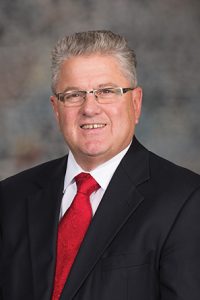Business tax incentives advanced after successful cloture vote
Lawmakers gave first-round approval May 22 to a bill that would create a new business tax incentive program to replace the Nebraska Advantage Act, which is set to end next year.
Sen. Mark Kolterman of Seward, sponsor of LB720, said the state’s existing business tax incentive programs have resulted in $30 billion in investment and approximately 100,000 new jobs. But those programs are outdated, he said, and need to be replaced by one that focuses on high-wage jobs and has a more predictable impact on state tax revenue.
A Revenue Committee amendment, adopted 34-7, would replace the bill. It would create a new program, called the ImagiNE Nebraska Act, under which businesses would apply to the state Department of Economic Development and enter into an agreement with the department if they meet the program’s requirements.
Qualifying businesses would receive a varying combination of incentives—wage credits, income tax credits, sales and use tax refunds and exemptions, personal property tax exemptions or real property tax refunds—based on their level of capital investment and the number of employees they hire at a minimum qualifying wage.
The incentives would be limited to certain business activities, including manufacturing; certain testing laboratories; rail and truck transportation; insurance carriers; wired and wireless telecommunications services; telemarketing bureaus; data processing and hosting services; computer facilities management services; and warehousing and storage.
Agriculture, mining, construction, utilities and public administration would not qualify for incentives.
The amendment also includes provisions of LB605, introduced by Omaha Sen. Brett Lindstrom, which would create a tax credit for companies that produce sustainable materials and renewable chemicals using agricultural products.
Lincoln Sen. Kate Bolz introduced an amendment, adopted 28-10, that includes provisions of her LB527, which would create a program to provide job training grants to employers.
Sen. Anna Wishart, also of Lincoln, introduced an amendment, adopted 30-13, which would require that new employees be full-time as defined in the Affordable Care Act in order for their hours to count toward the proposed wage credits.
A qualifying company also would be required to provide sufficient benefits—such as medical insurance, profit sharing plans and child care services—for employees, she said.
Wishart said the amendment also would create a discretionary fund for economic development projects that do not qualify for incentives under the act and are located in counties with fewer than 40,000 residents. A board could authorize up to $2 million in projects each year.
Additionally, the amendment would provide a 1 percent incentive multiplier for benefit corporations, a class of corporation that meets certain transparency and accountability standards and provides community benefits, she said.
Gothenburg Sen. Matt Williams supported the bill, saying he has seen firsthand how Nebraska’s current business tax incentives have helped communities across the state. Allowing the Nebraska Advantage Act to sunset without replacing it with a new program would deter business investment because companies plan years in advance for major projects, he said.
Sen. John Stinner of Gering also supported LB720, saying Nebraska needs an updated business tax incentive program to compete with other states. He said the state’s current business tax incentives are projected to generate approximately $100 million in new economic activity each year for the next decade.
Bolz said senators should be cautious about creating a new tax incentive program that would not cap the total amount of incentives granted each year. Unpredictable swings in tax revenue reductions under the state’s current tax incentive programs can crowd out other budget priorities, she said, such as property tax relief, education and others.
Plymouth Sen. Tom Brandt opposed the bill, calling it a “corporate welfare program” that would reduce total state revenue by 3 percent each year. He said the incentives would not help farmers or small businesses in a meaningful way and are focused on business recruitment at a time when existing businesses are asking instead for workforce development.
“We as a Legislature only get a chance to review these programs every five or 10 years,” Brandt said, “so let us get it right.”
Sen. Dave Murman of Glenvil said property tax relief should be the Legislature’s biggest concern this session.
“Creating a new tax incentive program is not our No. 1 priority,” he said. “What we need is property tax relief if we really want to grow.”
Elkhorn Sen. Lou Ann Linehan supported LB720, saying the ImagiNE Nebraska Act would improve on the Nebraska Advantage Act. Linehan, chairperson of the Revenue Committee, said senators should work together to pass LB720 and provide property tax relief this session.
“We can do both here,” she said. “We have to look at the big picture—the whole state—and be state senators, not senators for this group or that group.”
After six hours of debate on general file over two days, Kolterman filed a motion to invoke cloture, or cease debate and vote on the bill. The motion succeeded 37-8. Thirty-three votes were needed.
Senators then voted 29-5 to advance LB720 to select file.


